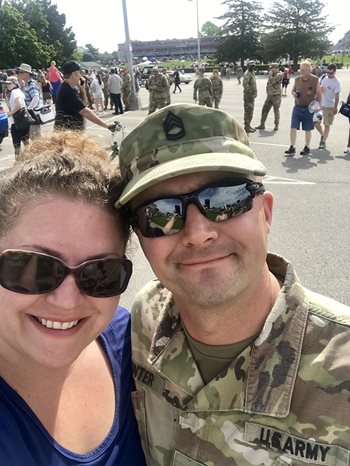National Military Spouse Appreciation Day honors the contributions, sacrifices, and support made by military spouses. Always the Friday before Mother’s Day, this day is set aside to recognize the impact military spouses have on our lives and our military communities. These silent heroes are essential to the strength of our great nation and their commitment helps keep our country safe and supported.
 Meet American Legion Auxiliary member Amanda Ginter, member of Indiana Auxiliary eUnit 438, and military spouse to Sgt. 1st Class Adam W. Ginter.
Meet American Legion Auxiliary member Amanda Ginter, member of Indiana Auxiliary eUnit 438, and military spouse to Sgt. 1st Class Adam W. Ginter.
What branch of the service is your husband in?
He’s in the Army. Actually, National Guard, but he’s fulltime. He’s active-duty guard. He’s been in the military since 1999.
How long have you been a military spouse?
We will be married seven years this year, but we’ve been together about 10.
Is there anything that prepared you for life as a military spouse?
No, not really. You can prepare if you go to these family readiness groups. But there’s not really anything you can fully prepare for until you live it.
What are some of the biggest challenges of being a military spouse?
When they are gone, it’s hard. We don’t have children, so we don’t have that aspect. So it’s kind of just me, so I just got to keep busy — or else I’m pretty much by myself. We have three dogs that keep me company, but it’s still hard. You just have to keep busy and be with friends. It’s a challenge being by yourself.
What do you find most rewarding about being a military spouse?
It’s rewarding in the fact that you’re just proud of them. You’re proud of them for doing their job — which is defending our country.
What would you say are some misconceptions people have of military spouses?
A lot of times people think we are just stay at home parents. A lot of military spouses have careers of their own, so they are balancing that as well. Their jobs aren’t necessarily high corporate, but it’s still something they have to juggle. With being by myself and without children, people wonder what I do or assume that I have it easier. It’s not necessarily easy, you still just want them home.
You also have to have trust in the relationship because they are gone a lot. There’s a high percentage of divorce rate too, so people assume you can’t handle when they are gone, so ‘what do you do?’ There’s always that undertone but they don’t come out and say it.
Do you have any advice to new military spouses?
If they have any type of family readiness, or support group — that’s a good place to start. Since they are volunteer groups, not all of them are excellent, but it’s good to go and talk with them. That way you can talk to other people going through similar circumstances. Talking to someone you know there will help give you some ideas, see how it works, do some research. Other than that, it’s hard to do when you start out. You just got to play it by ear.
You know your spouse, they know you, you work through it together, home or not home. You can handle it! Talk through it together.
What does it mean to you to have a day, Military Spouse Appreciation Day, set aside for military spouses like yourself?
It’s a really nice thing to have, we just don’t think about it because it’s our life. But having an appreciation day dedicated to spouses really means a lot. It’s nice to be appreciated because we go through a lot.
By Alexa Freeman, Staff Writer
In the spirit of Service, Not Self, the mission of the American Legion Auxiliary is to support The American Legion and to honor the sacrifice of those who serve by enhancing the lives of our veterans, military, and their families, both at home and abroad. For God and Country, we advocate for veterans, educate our citizens, mentor youth, and promote patriotism, good citizenship, peace and security.